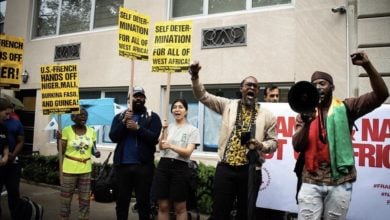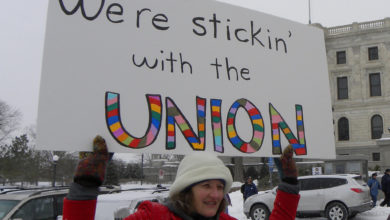Last week, the Bush administration admitted the existence of secret CIA prisons housing so-called “high value” prisoners. The prisons exist entirely outside the bounds of international law.
Detainees have been denied even the most basic legal protections and have been subjected to systematic torture and
 |
The admission came in a speech announcing that 14 such detainees had been moved to the Pentagon prison camp at Guantanamo Bay, Cuba. The base itself is an illegal occupation of Cuban territory.
The administration intends to conduct specially convened military tribunals for Guantanamo detainees. These tribunals would even deny prisoners the rudimentary legal protections provided by military courts-martial, such as the right of the accused to see the evidence against them and the exclusion of testimony extracted by torture.
This is no small matter. In his speech this week, Bush admitted that one of the transferred prisoners, Abu Zubaydah, had only provided information through the use of “alternative procedures,” a transparent euphemism for torture.
Bush made this admission in an attempt to encourage the legalization of such measures. In fact, the admission is deeply revealing: Even the most “hardened terrorists” couldn’t be convicted without the use of evidence gathered entirely through torture.
In June of this year, the Supreme Court ruled that the Bush administration exceeded its authority by convening the tribunals.
The ruling in Hamdan v. Rumsfeld was widely praised in liberal circles as a significant rebuke to the unchecked legal power of the state. But the ruling concerned an extremely narrow legal matter: whether the executive branch possesses the right to convene military tribunals for its Guantanamo prisoners. The ruling did not address the legal status of the prison torture camp itself or the continued existence and use of secret CIA prisons.
In framing its ruling according to these narrow parameters, the Supreme Court effectively encouraged Congress to enact laws that would legalize continuing abuse.
Congressional Hearings leading to the passage of such measures are already underway. Indeed, Bush’s announcement this week—timed to coincide both with the hearings and the fifth anniversary of Sept. 11—was intended to intensify pressure upon Congress to hasten the passage of legal approval for the tribunals.
Bush’s proposal has encountered some Congressional opposition. Republican senators John McCain, John Warner and Lindsey Graham have favored a tribunal system somewhat nearer to existing military courts-martial.
The juries of these proceedings consist of military officers selected by the high command. This means that the prosecution selects the jury and exercises command authority over it. However, such courts do ban testimony obtained through torture and require that defendants be allowed to view and challenge evidence used against them.
At its core, such disputes are merely tactical differences within the ruling class.
Senate minority leader Harry Reid articulated the position of the Democratic Party when he praised the administration for its decision to try the 14 transferred prisoners. His only disagreement with the Bush administration was the demand that the commission be set up according to a “bipartisan proposal” being drafted by the Senate Armed Services Committee.
Congress, the executive branch and the courts are working hand-in-hand to deprive the prisoners in Guantanamo of their rights. As this happens, the danger of stripping U.S. workers of our most elemental legal protections grows. This process reveals the class character of the capitalist state and its institutions.






